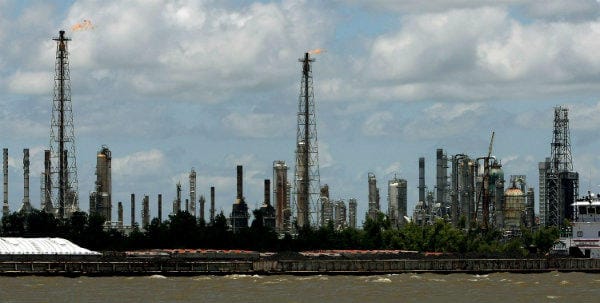
WASHINGTON - The oil industry's leading trade group on Monday cast exports of U.S. crude as an economic win for consumers, fighting against criticism that selling the fossil fuel overseas would mean higher prices at home.
The American Petroleum Institute commissioned a study by ICF International and EnSys Energy predicting lower gasoline prices, domestic job growth and other economic benefits if the United States lifts its 39-year-old ban on exporting U.S. crude.
"Consumers are among the first to benefit from free trade, and crude oil is no exception," said API Vice President Kyle Isakower told reporters in a conference call Monday. "Gasoline costs are tied to a global market, and this study shows that additional exports could help increase supplies, put downward pressure on the prices at the pump and bring more jobs to America."
The new study finds that oil exports would reach 2 million barrels per day by 2017 - nearly a quarter of current production - if the trade restrictions were lifted.
The big beneficiaries would be domestic oil producers, who would see U.S. crude prices climb closer to global benchmark, Brent crude.
The study determined that, if crude oil exports were allowed, gasoline prices in the United States would cost 1.4 to 2.3 cents less per gallon between 2015 and 2035, measured in 2011 dollars. Lower overall costs for gasoline, heating oil and diesel could yield an extra $5.8 billion in annual consumer savings, ICF International and EnSys Energy found.
Energy chief: Industry arguments for exporting US oil are unconvincingCritics of easing the export ban, including Sen. Ed Markey, D-Mass., have argued that by sending domestic oil prices higher, gasoline costs would inevitably climb.
API's Isakower said the ICF report was "the most detailed analysis available" on the wide-ranging economic effects of potential crude exports, though at least three other studies are currently in the works, including one from the U.S. Energy Information Administration.
But the margins for domestic refiners would be squeezed if the export ban were lifted, because they would pay more for crude oil even as the price of the resulting gasoline dips slightly, ICF said.
If exports were allowed, "the increase in domestic crude prices is much larger than the reduction in world crude oil prices, and so the average cost of crude to U.S. refineries goes up more than do refined product prices," the study said. "This is the major reason why refinery margins decline."
Related story: Want to hurt Russia? Oil exec says export crudeICF's discussion of how oil exports would shake up U.S. refining puts new numbers behind the sector's apprehension on the issue. Under the current dynamic, refiners are able to freely export gasoline, diesel and other petroleum products, even though the U.S. largely blocks exports of raw, unprocessed crude. The scenario ensures they have been exporting record amounts of the refined products and enjoying relatively high margins, as domestic oil production surges.
"The lower prices for U.S. oil, a result of surging production, improve U.S. refinery margins but do not reduce gasoline or diesel prices," the study said, because refiners "have the ability to export these products at global market prices."
With the prospect of oil exports threatening that dynamic, some small, independent refiners have formed a coalition to fight changes to the 39-year-old trade restrictions.
Read more: US oil glut stirs up political dilemmaOil industry leaders say exports also are needed to help resolve a mismatch between domestic production of light, sweet crude, and U.S. refineries optimized for processing heavier varieties.
"Often, it makes sense to export a surplus of expensive, light oil from one region and import cheaper, heavy oil in another, rather than ship more expensive oil cross-country," Isakower said. "This is especially true in the absence of sufficient infrastructure to efficiently transport crude to the refineries that could use it. But export restrictions effectively insulate consumers from the positive benefits of efficient markets."
The report also predicted that expanding crude exports would:
- spur as much as $70.2 billion in additional investment in U.S. oil exploration, development and production between 2015 and 2020.
- put an extra 110,000 to 500,000 barrels online every day in 2020.
- boost U.S. refinery throughput by 100,000 barrels per day from 2015 to 2035, by ending refinery process bottlenecks caused by mismatched crudes.
- support 300,000 new jobs across the economy in 2020.
 Some ICF projects I've worked on Page 12 Page 14
Some ICF projects I've worked on Page 12 Page 14